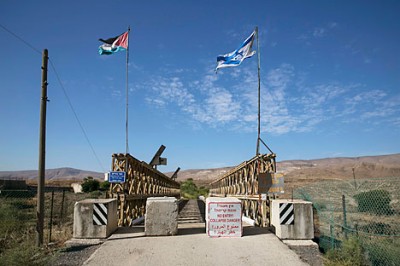Russia Offers Support to Palestinian Statehood
Representative to the UN says that Russia will back a resolution on Palestinian statehood if one is offered.

Image: National Jordanian and Israeli flags are seen on the Naharayim bridge on the border between Israel and Jordan north-eastern Israel October 22, 2014. Source: Reuters
Vitaly Churkin, Russia’s Permanent Representative to the United Nations has announced that Russia will back a resolution calling for a Palestinian state, if one is presented. “Russia will support the resolution establishing the terms for Israeli withdrawal and the creation of the Palestinian state if it is presented to the UN Security Council,” Churkin said. “If the resolution is presented, we will vote for it.”
His comments come after Palestine’s delegation to the UN decided not to present a resolution on statehood to the UN Security Council on Oct. 21, as was expected. The expected resolution was believed to lay out concrete terms for the creation of a Palestinian state and the withdrawal of Israeli troops from the West Bank, including East Jerusalem, by 2016.
Churkin’s promise to support Palestine did not come as a surprise. Russia has long supported the idea of creating an independent Palestinian state, and Russian diplomats have often expressed this position publicly. At a meeting in Cairo this month on rebuilding in the Gaza Strip, Mikhail Bogdanov, the Russian President’s Special Representative for the Middle East, said: “We believe that the Palestinian cause is just, and that the Palestinian people have the right to self-determination, to create their own state.”
Russia’s support for Palestine raises questions of the country’s relationship with Israel. Russian speakers make up one-fifth of Israel’s population and Israel not only declined to support the West’s economic sanctions against Russia, but also intends to increase its supplies of agricultural products to Russia.
Russian experts agree that Russia takes little risk in supporting a resolution for Palestinian statehood because the chances of Palestinian statehood becoming a reality are slim.
“Israel understands that Russia supports Palestine. Almost the entire world supports Palestine, so what?” said Georgy Mirsky, a research fellow at the Institute of World Economics and International Relations at the Russian Academy of Sciences.
“It is all a game, because the real situation in Palestine, the one on the ground and not in the UN corridors, does not change. Israel will not permit the creation of a full-fledged Palestinian state for many reasons, among which are the problem with the status of East Jerusalem, the issue of the settlements, the problem of Israeli troops of the border with Jordan and the millions of refugees who are ready to pour into Palestinian territories.”
Churkin also believes that the resolution, should it be introduced, has little chance of being passed. “The chances of the resolution being adopted are slim, since such a resolution will most likely be vetoed by the United States,” Churkin said in an interview with Russian news agency RIA Novosti.
Grigory Kosach, a professor of history at the Russian State University of the Humanities Institute, thinks that Russia’s willingness to support the Palestinian resolution is a step in the right direction, since Russia has not always been able to successfully maintain a balance in its relations with Palestine and Israel:
“Russia indeed has excellent relations with Israel and if we look at how Russia’s position on the creation of the Palestinian state has varied throughout the years, we will see that sometimes economic gains from cooperation with Israel prevailed over the political advantages in supporting Palestine. Of course it’s good that now Russia is supporting the initiative to create a Palestine state, but how realistic is this project?”
Kosach said.
In his opinion, the recent statements of support for Palestine by Russian officials are intended to irritate the U.S. “In many ways this move aims to annoy the US and also, by supporting Palestine, Russia strengthens its political standings in the Arab countries.”

